-
REVIEW05-03-2024
Elements of fatherhood involved in the gestational period: a scoping review
Revista Brasileira de Enfermagem. 2024;77(1):e20230029
Abstract
REVIEWElements of fatherhood involved in the gestational period: a scoping review
Revista Brasileira de Enfermagem. 2024;77(1):e20230029
DOI 10.1590/0034-7167-2023-0029
Views0See moreABSTRACT
Objective:
To identify in the literature and summarize the elements and characteristics of fatherhood involved during pregnancy.
Method:
Scoping review that used PRISMA-ScR guide to report this review. Searches were carried out in PubMed, CINAHL, PsycInfo, LILACS and Scopus. Google search engines and public health agency websites assisted in searches of gray literature and Rayyan in screening studies.
Results:
A total of 406 articles were identified, of which 16 made up the final sample. Five elements make up an involved fatherhood: feeling like a father, being a provider and protector, being a partner and participant in pregnancy, participating in prenatal appointments and feeling prepared to take care of a baby.
Conclusion:
Fathers want to be involved in prenatal care, but feel excluded from this process. Public policies that encourage paternal involvement and healthcare professional training to better welcome and promote paternal involvement are of paramount importance.
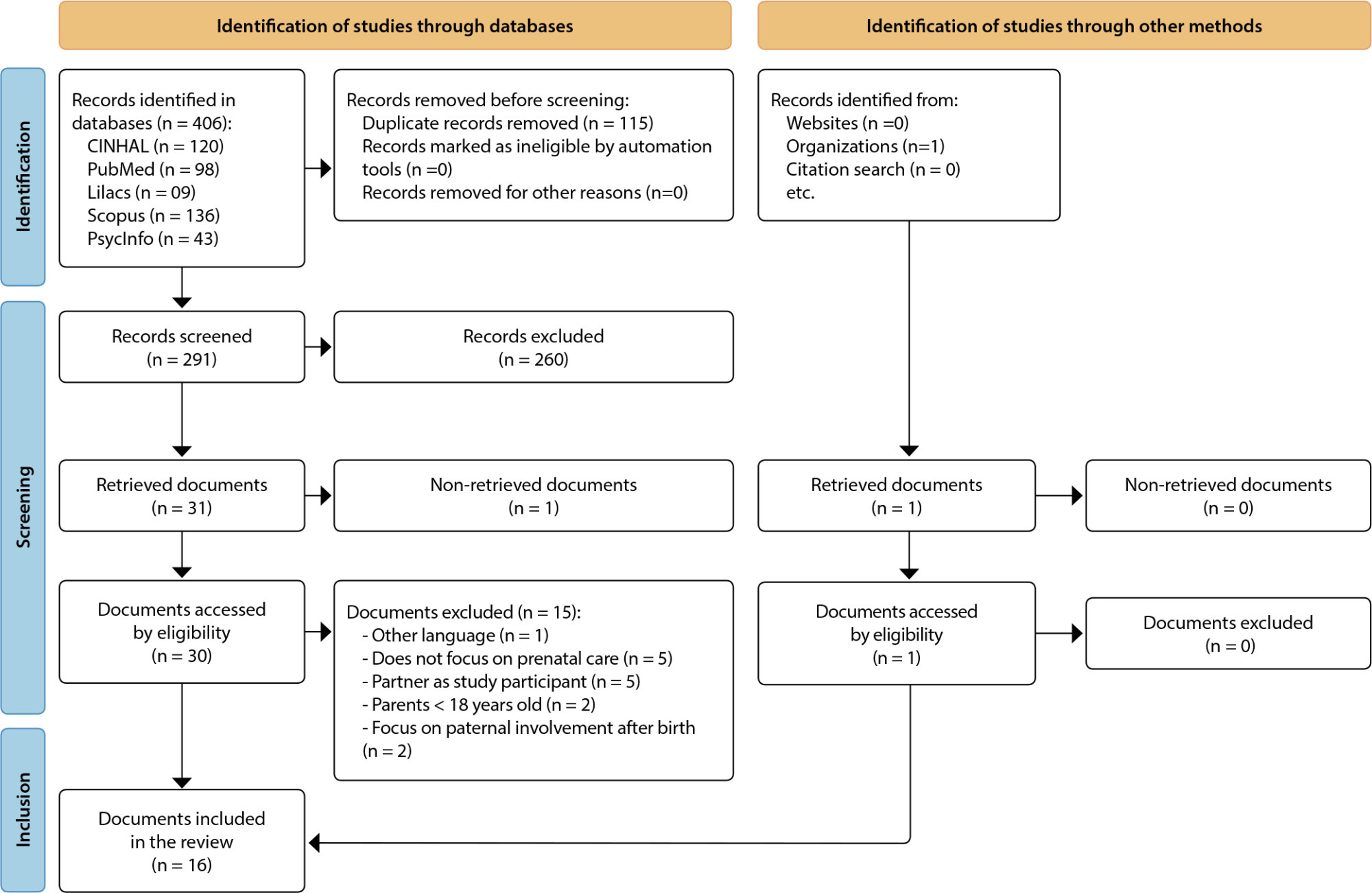
-
ORIGINAL ARTICLE05-03-2024
Josicélia Dumêt Fernandes’ professional trajectory: contributions to psychiatric and mental health nursing
Revista Brasileira de Enfermagem. 2024;77(1):e20230174
Abstract
ORIGINAL ARTICLEJosicélia Dumêt Fernandes’ professional trajectory: contributions to psychiatric and mental health nursing
Revista Brasileira de Enfermagem. 2024;77(1):e20230174
DOI 10.1590/0034-7167-2023-0174
Views0See moreABSTRACT
Objectives:
to analyze nurse Josicélia Dumêt Fernandes’ life story, with emphasis on her work in the psychiatry and mental health fields.
Methods:
historical, qualitative research. Semi-structured interviews and documentary research were used as data collection techniques, collected from September to October 2021. For data analysis, we opted for the content analysis method and comparison with the Foucauldian philosophical framework.
Results:
four categories emerged: Transforming herself and mental health practices; (Re)framing professional practice; Nursing practice and power relations; and The paths and implications in the psychiatry and mental health fields.
Final Considerations:
the study of the biographer demonstrates a search for transformation of herself and mental health practices, with a rupture in paradigms and reframing of her practice in psychiatry and mental health.
-
ORIGINAL ARTICLE05-03-2024
Psychometric properties of the Chilean version of the quality of life questionnaire for multiple myeloma
Revista Brasileira de Enfermagem. 2024;77(1):e20230100
Abstract
ORIGINAL ARTICLEPsychometric properties of the Chilean version of the quality of life questionnaire for multiple myeloma
Revista Brasileira de Enfermagem. 2024;77(1):e20230100
DOI 10.1590/0034-7167-2023-0100
Views0See moreABSTRACT
Objectives:
To evaluate the internal consistency and construct validity of the QLQ-MY20 for assessing the quality of life in multiple myeloma survivors in Chile.
Methods:
This was a cross-sectional study conducted between March 2020 and December 2022. It involved 118 individuals from two public hospitals. The QLQ-C30 and QLQ-MY20 questionnaires were used. Internal consistency was assessed using Cronbach’s alpha(α), and construct validity was evaluated through hypothesis testing (Mann-Whitney and Spearman correlation).
Results:
The average age of participants was 67.2 years (SD=9.2). Internal consistency for the complete scale was α=0.779, for the “disease symptoms” dimension α=0.671, for the “side effects of treatments” dimension α=0.538, and for the “future perspective” dimension α=0.670. Four of the five construct validity hypotheses were confirmed: women, individuals with worse performance status, those with pain, and those with worse fatigue showed more symptoms.
Conclusions:
The Chilean version of the QLQ-MY20 demonstrates adequate internal consistency and construct validity.
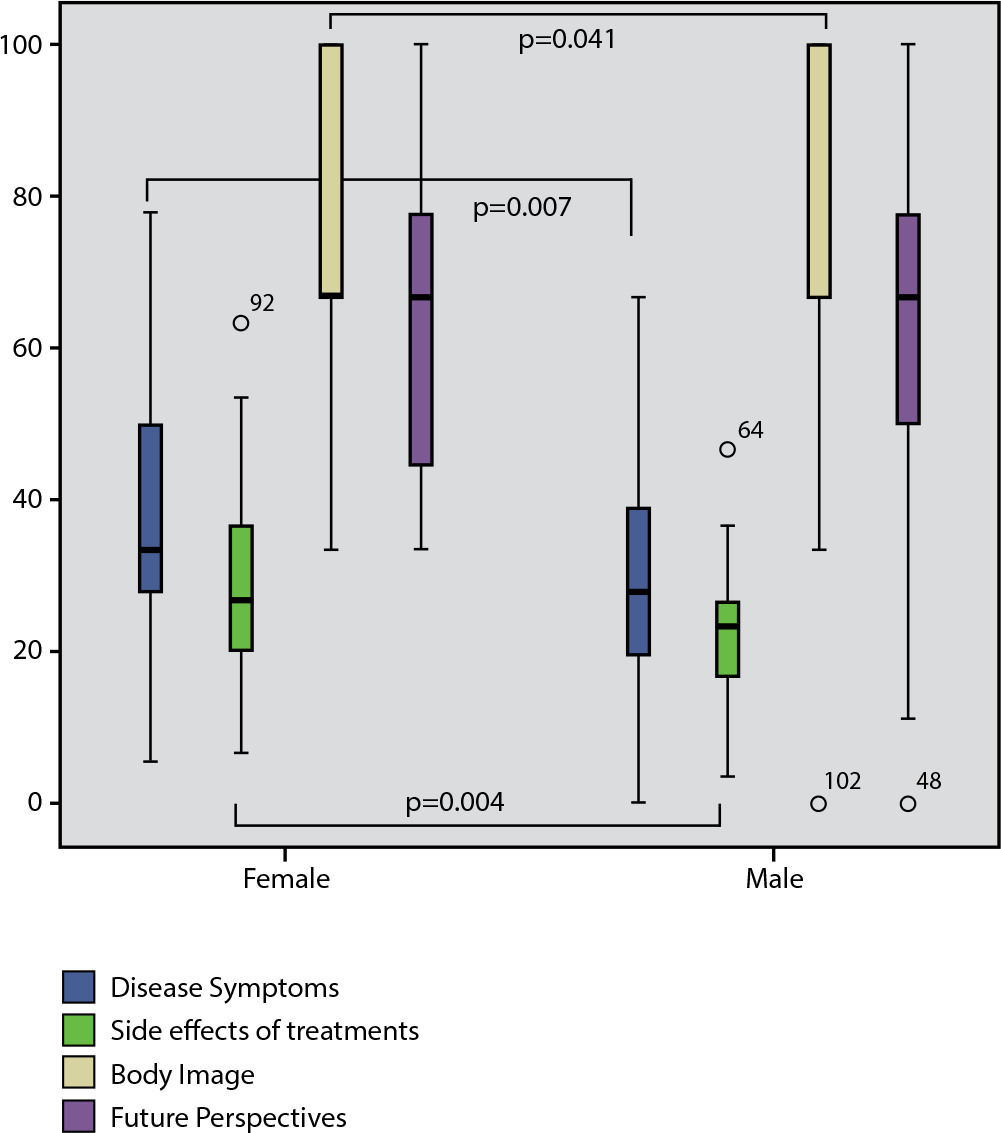
-
ORIGINAL ARTICLE05-03-2024
Pregnancy loss in women with systemic lupus erythematosus: Grounded Theory
Revista Brasileira de Enfermagem. 2024;77(1):e20230225
Abstract
ORIGINAL ARTICLEPregnancy loss in women with systemic lupus erythematosus: Grounded Theory
Revista Brasileira de Enfermagem. 2024;77(1):e20230225
DOI 10.1590/0034-7167-2023-0225
Views0See moreABSTRACT
Objective:
to learn the meanings attributed to pregnancy loss by women with Lupus.
Method:
qualitative research, based on Symbolic Interactionism and Grounded Theory. Data collection took place between January and August 2022 through in-depth interviews. Data analysis went through the stages of initial and focused coding.
Results:
seventeen women participated. The central phenomenon “The climb to motherhood: falls and overcoming” was constructed, consisting of three categories: “Falling to the ground during the climb: the experience of pregnancy loss”; “Getting up and following the path: new attempts to conceive”; and “Remembering the journey: meanings attributed to pregnancy losses”.
Final considerations:
experiencing pregnancy is, analogously, like climbing a mountain, where obstacles need to be overcome to reach the summit. The experience of pregnancy loss is seen as complex, especially when there is fragility in healthcare and a lack of awareness regarding feelings of loss and grief.
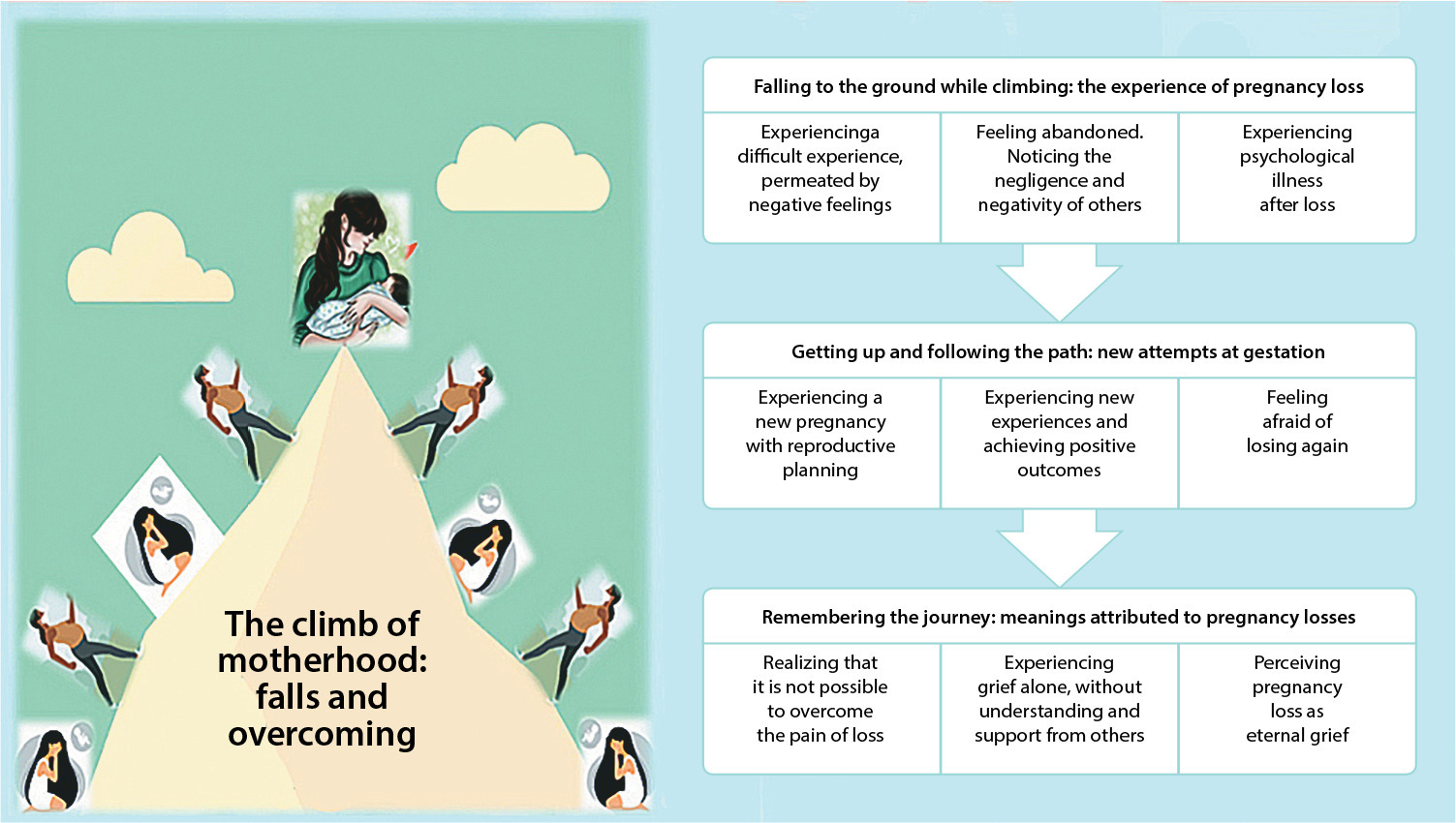
-
05-03-2024
Preditores de volume excessivo de líquidos em pacientes em hemodiálise: estudo observacional
Revista Brasileira de Enfermagem. 2024;77(1):e20220816
Abstract
Preditores de volume excessivo de líquidos em pacientes em hemodiálise: estudo observacional
Revista Brasileira de Enfermagem. 2024;77(1):e20220816
DOI 10.1590/0034-7167-2022-0816
Views0See moreRESUMEN
Objetivos:
evaluar los factores de riesgo del exceso de volumen de líquido en pacientes en hemodiálisis.
Métodos:
estudio retrospectivo de casos y controles. Se incluyeron 392 pacientes (196 casos y 196 controles) de dos centros de hemodiálisis. Se evaluaron datos sociodemográficos y 23 factores de riesgo de exceso de volumen de líquido mediante un formulario de recolección de datos. Los datos se analizaron mediante un modelo de regresión logística multivariado.
Resultados:
factores de riesgo conocimiento insuficiente (OR=2,06), ingesta excesiva de líquidos (OR=2,33), retirada inadecuada de líquidos durante la hemodiálisis (OR=2,62) e ingesta excesiva de sodio (OR=1,91) pueden aumentar aproximadamente dos veces la posibilidad de que se produzca un exceso de volumen de líquido en pacientes en hemodiálisis. La educación (OR=0,95) y la edad (OR=0,97) son factores protectores del volumen excesivo de líquido.
Conclusiones:
conocer estos factores de riesgo puede ayudar a las enfermeras a realizar una inferencia diagnóstica precisa y rápida del riesgo de volumen excesivo de líquidos.
-
REVIEW05-03-2024
Nursing interventions to empower the family caregiver of person with lower limb amputation: scoping review
Revista Brasileira de Enfermagem. 2024;77(1):e20230264
Abstract
REVIEWNursing interventions to empower the family caregiver of person with lower limb amputation: scoping review
Revista Brasileira de Enfermagem. 2024;77(1):e20230264
DOI 10.1590/0034-7167-2023-0264
Views0See moreABSTRACT
Objectives:
to map nursing interventions that empower the Family caregiver of the person with lower limb amputation for is role.
Methods:
scoping review guided by Joanna Briggs Institute methodology conducted in different databases (including gray literature).
Results:
six studies published between 2009 and 2021 were included. Interventions of counselling and support for patients and family; peer support interventions performed by a certified pair; involvement of caregivers or family members in support groups; and key interventions for patient and family caregiver psychological balance. Two studies discussed the importance of caregiver and amputee training and development of coping skills. Another study recommended Interventions of informative support for caregivers regarding care for the amputee and adaptation to home.
Conclusions:
results of this review allow the identification of recommendations (guidelines) for practice and recommendations/suggestions for interventions according with identified needs of family caregivers of patients with lower limb amputation.
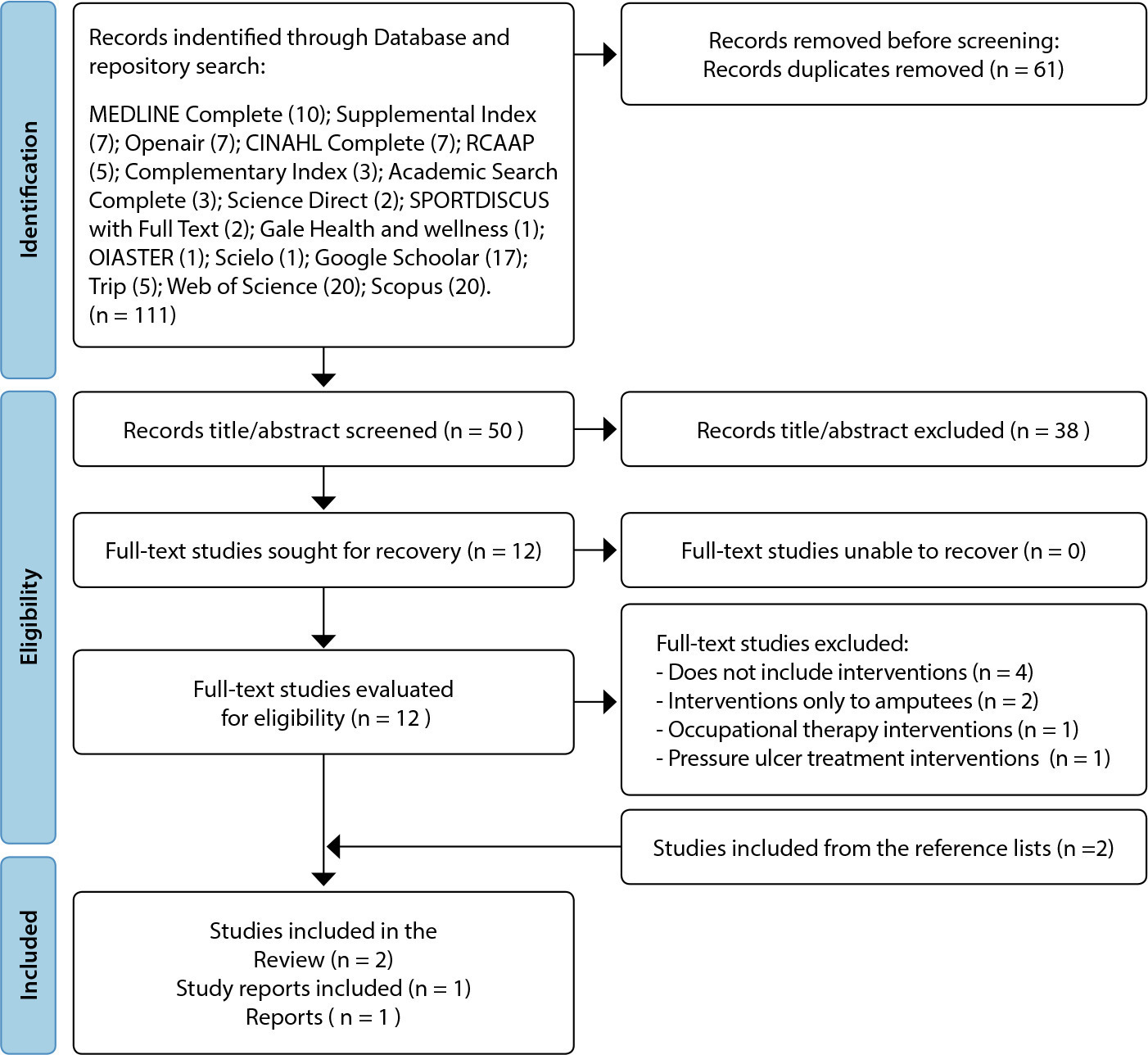
-
05-03-2024
Intervenções de Enfermagem para capacitar o cuidador familiar de uma pessoa com amputação de membro inferior: revisão de escopo
Revista Brasileira de Enfermagem. 2024;77(1):e20230264
Abstract
Intervenções de Enfermagem para capacitar o cuidador familiar de uma pessoa com amputação de membro inferior: revisão de escopo
Revista Brasileira de Enfermagem. 2024;77(1):e20230264
DOI 10.1590/0034-7167-2023-0264
Views0See moreRESUMEN
Objetivos:
mapear intervenciones de enfermería que capaciten al cuidador familiar de la persona con amputación de miembro inferior para su rol.
Métodos:
es una revisión de alcance guiada por la metodología del Instituto Joanna Briggs, llevada a cabo en diferentes bases de datos (incluyendo literatura gris).
Resultados:
se tuvieron en cuenta seis estudios publicados entre 2009 y 2021, a saber: intervenciones de asesoramiento y apoyo para pacientes y familiares; intervenciones de apoyo entre iguales realizadas por un par de profesionales certificados; participación de cuidadores o familiares en grupos de apoyo e intervenciones clave para el equilibrio psicológico del paciente y del cuidador familiar. Dos estudios analizaron la importancia de la formación del cuidador y del amputado y del desarrollo de habilidades de afrontamiento. Otro estudio recomendó intervenciones de apoyo informativo para los cuidadores en relación con el cuidado del amputado y su adaptación a la vida hogareña.
Conclusiones:
los resultados de esta revisión permiten identificar recomendaciones/directrices para la práctica y recomendaciones/sugerencias de intervenciones según las necesidades identificadas de los cuidadores familiares de pacientes con amputación de miembros inferiores.
-
05-03-2024
Propiedades psicométricas de la versión chilena del cuestionario de calidad de vida para mieloma múltiple
Revista Brasileira de Enfermagem. 2024;77(1):e20230100
Abstract
Propiedades psicométricas de la versión chilena del cuestionario de calidad de vida para mieloma múltiple
Revista Brasileira de Enfermagem. 2024;77(1):e20230100
DOI 10.1590/0034-7167-2023-0100es
Views0See moreRESUMEN
Objetivos:
Evaluar consistencia interna y validez de constructo del QLQ-MY20 para valoración de calidad de vida en sobrevivientes de mieloma múltiple en Chile.
Métodos:
Estudio transversal, realizado entre marzo 2020 y diciembre 2022. Participaron 118 personas de dos hospitales públicos. Se utilizaron los cuestionarios QLQ-C30 y QLQ-MY20. Fueron evaluadas la consistencia interna con alfa de Cronbach (α) y validez de constructo mediante pruebas de hipótesis (Mann Whitney y correlación de Spearman).
Resultados:
El promedio de edad de los participantes era 67,2 (DE=9,2) años. Consistencia interna para escala completa (α=0,779), dimensión “síntomas de la enfermedad” (α=0,671), dimensión “efectos secundarios de los tratamientos” (α=0,538) y dimensión “perspectiva de futuro” (α=0,670). Se comprobaron cuatro de las cinco hipótesis de la validez de constructo: presentaron más síntomas las mujeres, personas con peor performance estatus, con dolor y con peor fatiga.
Conclusiones:
La versión chilena del QLQ-MY20 presenta adecuada consistencia interna y validez de constructo.
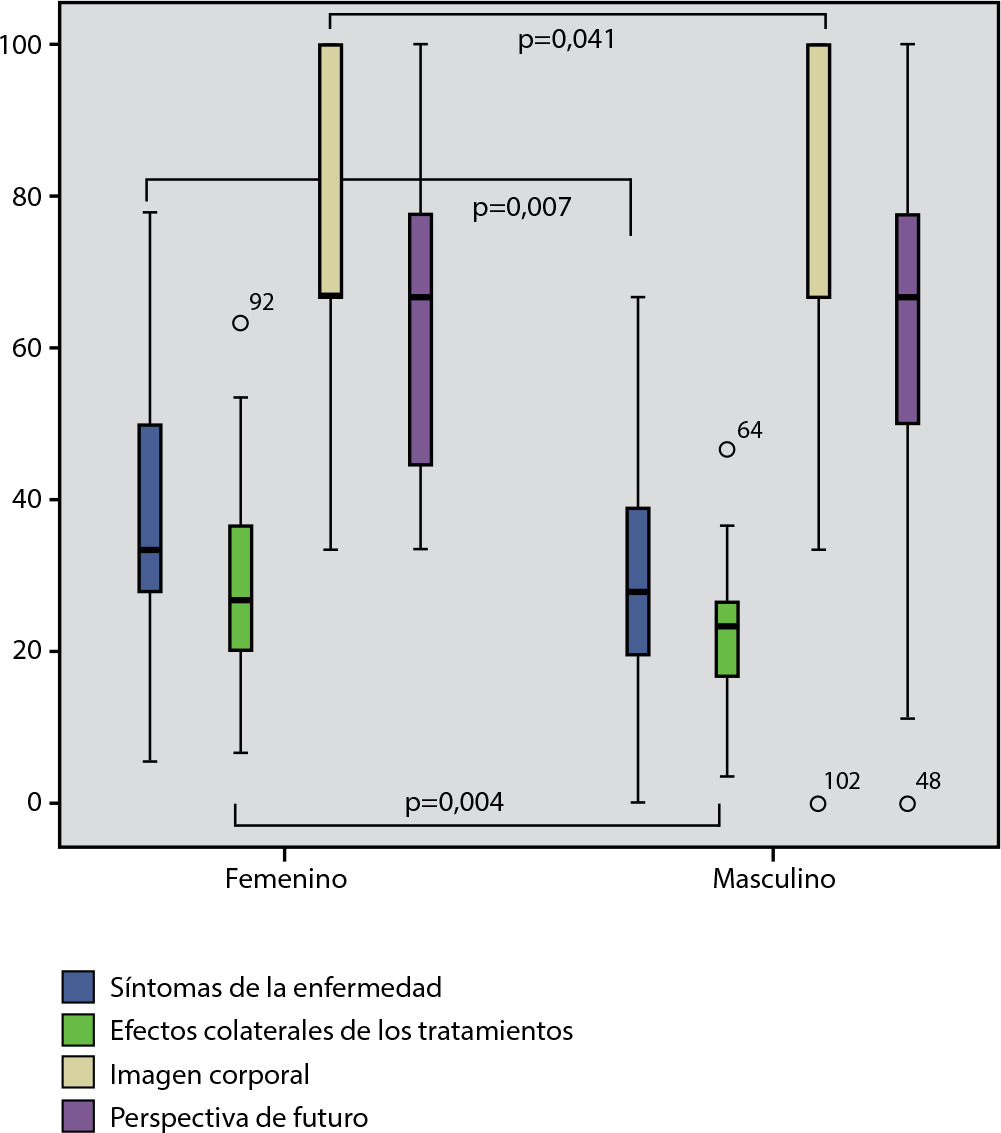
-
EXPERIENCE REPORT01-01-2017
Focus group on qualitative research: experience report
Revista Brasileira de Enfermagem. 2017;70(2):424-429
Abstract
EXPERIENCE REPORTFocus group on qualitative research: experience report
Revista Brasileira de Enfermagem. 2017;70(2):424-429
DOI 10.1590/0034-7167-2016-0091
Views1See moreABSTRACT
Objective:
to report the experience of applying the focus group technique for production of data in qualitative research.
Method:
four group sessions were held from May to June 2015, with the participation of professionals from the public sector of PHC and from specialized service.
Results:
the way focus group was developed is described in steps: planning, recruitment, ambience, group sessions, and evaluation.
Conclusion:
we highlight that the focus group, as a technique to produce data in collective space, can contribute not only to the construction of knowledge in Nursing, but also to the research approach with the assistance practice.

-
RESEARCH01-01-2017
Guide of attributes of the nurse’s political competence: a methodological study
Revista Brasileira de Enfermagem. 2017;70(3):526-534
Abstract
RESEARCHGuide of attributes of the nurse’s political competence: a methodological study
Revista Brasileira de Enfermagem. 2017;70(3):526-534
DOI 10.1590/0034-7167-2016-0483
Views0See moreABSTRACT
Objective:
To build and validate a guide of attributes of the nurse’s political competence.
Method:
Methodological research. This study comprised the construction of the instrument through literature review; experts validation of pre-established attributes for composing the guide; and clinical validation in the nurses work environment/reality. The data collection took place in the months from August to October 2014, and the analysis was based on the content analysis of Bardin and use of Epi info 3.5. All ethical precepts have been complied with.
Results:
From 29 attributes found in the literature, 25 have been validated by experts. Clinical/practical validation involved the participation of 43 nurses, who observed that the attributes are not articulated with the professional practices developed by them.
Conclusion:
The attributes of the nurse’s political competence were identified with support of literature. It is concluded that the professionals still have limited and fragmented perception of political competence, expressing difficulty/limitation.
-
ORIGINAL ARTICLE10-09-2023
Independent and combined effects of lifestyle behaviors on adolescent health-related quality of life
Revista Brasileira de Enfermagem. 2023;76(4):e20220780
Abstract
ORIGINAL ARTICLEIndependent and combined effects of lifestyle behaviors on adolescent health-related quality of life
Revista Brasileira de Enfermagem. 2023;76(4):e20220780
DOI 10.1590/0034-7167-2022-0780
Views0See moreABSTRACT
Objective:
To investigate the independent and combined effects of lifestyle behaviors, including physical activity, sedentary behavior, sleep duration and food intake, in the health-related quality of life (HRQoL) of Brazilian adolescents.
Methods:
Cross-sectional school-based study, with the participation of 306 adolescents aged 14 to 18 years. A questionnaire was applied with structured questions to collect lifestyle behaviors data. Perception of the HRQoL was identified using the Kidscreen-27. The study used covariance analysis and linear regression models for statistical analysis.
Results:
Adolescents who reported ≤ 2 hours/day of screen-based sedentary behavior and sleep duration equivalent to 8-10 hours/night presented significantly higher HRQoL. Adolescents who reported joint adherence ≥ 3 healthy lifestyle behaviors demonstrated approximately two [OR=2.12] to three times [OR=3.04] more chance of presenting higher perceptions of HRQoL.
Conclusion:
Although healthy lifestyle behaviors had a positive independent effect on HRQoL, joint adherence to healthy behaviors enhances the cumulative effect.

-
12-04-2023
Sleep quality of nurses who worked in coping with COVID-19: an integrative review
Revista Brasileira de Enfermagem. 2023;76(6):e20230007
Abstract
Sleep quality of nurses who worked in coping with COVID-19: an integrative review
Revista Brasileira de Enfermagem. 2023;76(6):e20230007
DOI 10.1590/0034-7167-2023-0007
Views0See moreABSTRACT
Objective:
to analyze sleep quality of nurses who worked coping with COVID-19 in scientific evidence.
Methods:
an integrative review, carried out in seven databases, including studies between December 2021 and June 2022, without language restrictions. The sample consisted of 15 primary studies.
Results:
nurses working in hospital, intensive care, outpatient care and teaching institutions constitute a vulnerable group for sleep disorders: latency, duration, efficiency and quality. The disorders identified involved insomnia at varying levels of severity: daytime dysfunction and morning sleepiness. Night work and low capacity for self-care were determinants of impaired sleep patterns.
Final considerations:
the COVID-19 pandemic contributed to greater vulnerability of nurses to changes in sleep, requiring strategies for risk management and well-being promotion.

-
ORIGINAL ARTICLE12-08-2023
Care for older adults with disabilities in Long Term Care Facility
Revista Brasileira de Enfermagem. 2023;76:e20220767
Abstract
ORIGINAL ARTICLECare for older adults with disabilities in Long Term Care Facility
Revista Brasileira de Enfermagem. 2023;76:e20220767
DOI 10.1590/0034-7167-2022-0767
Views0See moreABSTRACT
Objective:
to analyze the constitution of care offered to older adults with disabilities, from Long Term Care Facility professionals’ perspective.
Methods:
this is a discourse analysis based on the post-structuralist framework. Participants in this study are professionals involved in the care for older adults, totaling 14 respondents, 13 women and one man.
Results:
from professionals’ perspective, there is a fine line between caring for older adults with disabilities and maintaining their autonomy. Care in which autonomy is restricted predisposes older adults to a process of dependency.
Final considerations:
caring for older adults with disabilities constitutes the challenge between caring and maintaining independence. Thus, older adult-centered care should be taken as a premise so that their individualities are respected.
-
ORIGINAL ARTICLE12-08-2023
Polypharmacy, potentially inappropriate medications and associated factors among older adults with hypertension in primary care
Revista Brasileira de Enfermagem. 2023;76:e20220785
Abstract
ORIGINAL ARTICLEPolypharmacy, potentially inappropriate medications and associated factors among older adults with hypertension in primary care
Revista Brasileira de Enfermagem. 2023;76:e20220785
DOI 10.1590/0034-7167-2022-0785
Views0See moreABSTRACT
Objective:
to identify the prevalence and associations of polypharmacy and potentially inappropriate medication use among older adults with hypertension treated in primary care.
Methods:
a cross-sectional study carried out with older adults with hypertension treated at a Family Health Strategy unit. Data collection included analysis of medical records, interviews and multidimensional assessment of older adults. Socio-demographic information and clinical variables were collected. Statistical analysis was performed by multiple logistic regression.
Results:
polypharmacy prevalence was 38.09%, and potentially inappropriate medication (PIM), 28.57%. There was a significant association between polypharmacy and PIM use, altered sleep and ethnicity. PIM use was associated with polypharmacy, worse family functioning, and absence of a caregiver. Cognitive decline reduces the prevalence of these medications.
Conclusions:
polypharmacy and PIM use among older adults with hypertension represent a problem in this population, especially among the most vulnerable.
-
REVIEW12-08-2023
Educational technologies used to promote self-care for people with diabetes mellitus: integrative review
Revista Brasileira de Enfermagem. 2023;76:e20230049
Abstract
REVIEWEducational technologies used to promote self-care for people with diabetes mellitus: integrative review
Revista Brasileira de Enfermagem. 2023;76:e20230049
DOI 10.1590/0034-7167-2023-0049
Views0See moreABSTRACT
Objective:
To summarize the scientific productions that used educational technologies to promote self-care for people with diabetes.
Method:
Integrative review carried out from October 2022 to January 2023, in the databases: LILACS; Scopus; Embase; PubMed/MEDLINE and CINAHL. The search was paired, and the sample consisted of ten articles. The levels of evidence were analyzed by the Hierarchy of Evidence for Intervention Studies, and the results were synthesized for interpretation of the findings.
Results:
The educational technologies identified to promote self-care were: mobile applications, interactive platforms, print, telemonitoring, video and simulation. The focus of the contents was on the promotion of foot care, prevention of neuropathy, self-management, knowledge, and expectation of people with diabetes and prevention of acute complications.
Conclusion:
The synthesis of knowledge about educational technologies to promote self-care for people with diabetes pointed to the need for robust evidence.

-
ORIGINAL ARTICLE05-03-2024
What is the burden of multimorbidity and the factors associated with its occurrence in elderly Brazilians?
Revista Brasileira de Enfermagem. 2024;77(1):e20220809
Abstract
ORIGINAL ARTICLEWhat is the burden of multimorbidity and the factors associated with its occurrence in elderly Brazilians?
Revista Brasileira de Enfermagem. 2024;77(1):e20220809
DOI 10.1590/0034-7167-2022-0809
Views0See moreABSTRACT
Objective:
To estimate the prevalence of multimorbidity in elderly people and its association with sociodemographic characteristics, lifestyle, and anthropometry.
Methods:
This was a cross-sectional study using data from the National Health Survey, 2019. A total of 22,728 elderly individuals from all 27 Brazilian states were randomly selected. Poisson regression models with robust variance were employed, and a significance level of 5% was adopted.
Results:
The prevalence of multimorbidity was 51.6% (95% CI: 50.4-52.7), with the highest estimates observed in the South and Southeast. Multimorbidity was associated with being female (aPR = 1.33; 95% CI: 1.27-1.39), being 80 years old or older (aPR = 1.12; 95% CI: 1.05-1.19), having low education (aPR = 1.16; 95% CI: 1.07-1.25), past cigarette use (aPR = 1.16; 95% CI: 1.11-1.21), insufficient physical activity (aPR = 1.13; 95% CI: 1.06-1.21), and screen use for 3 hours or more per day (aPR = 1.13; 95% CI: 1.08-1.18).
Conclusion:
Multimorbidity affects more than half of the elderly population in Brazil and is associated with social, demographic, and behavioral factors.

Search
Search in:
Nuvem de Tags
Adolescente (85) Atenção Primária à Saúde (239) COVID-19 (91) Criança (91) Cuidados de Enfermagem (269) Educação em Enfermagem (151) Educação em Saúde (139) Enfermagem (930) Enfermagem Pediátrica (86) Estudantes de Enfermagem (77) Estudos de Validação (131) Família (87) Idoso (208) Promoção da Saúde (99) Qualidade de Vida (104) Saúde do Trabalhador (86) Saúde Mental (145) Saúde Pública (82) Segurança do Paciente (150) Tecnologia Educacional (100)



